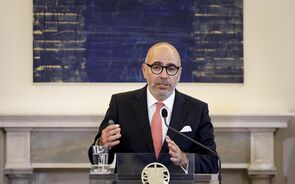13:30 - Dados States
1 Mensagem
|Página 1 de 1
13:30 - Dados States
8:30am 05/14/04 U.S. APRIL ENERGY PRICES UP 0.1%, GASOLINE -0.3%
8:30am 05/14/04 U.S. MARCH BUSINESS SALES UP RECORD 2.9%
8:30am 05/14/04 U.S. APRIL FOOD PRICES UP 0.2%, DAIRY UP 1.6%
8:30am 05/14/04 U.S. APRIL MEDICAL PRICES UP 0.4%
8:30am 05/14/04 U.S. APRIL HOUSING PRICES UP 0.4%
8:30am 05/14/04 U.S. CPI UP 2.3% YEAR-OVER-YEAR, CORE UP 1.8%
8:29am 05/14/04 U.S. APRIL CPI UP 0.2% AS EXPECTED
8:30am 05/14/04 U.S. APRIL CORE CPI UP 0.3% VS. 0.2% EXPECTED
8:30am 05/14/04 U.S. MARCH BUSINESS INVENTORIES UP 0.7%
8:30am 05/14/04 U.S. MARCH INVENTORY-TO-SALES RATIO RECORD LOW 1.30
U.S. March inventory-to-sales ratio falls to record low
WASHINGTON (CBS.MW) -- A record surge in U.S. business sales helped the inventory-to-sales ratio set a new record low in March, the Commerce Department said Friday.
Business inventories rose 0.7 percent in March, the seventh consecutive increase.
Inventories rose to a record $1.2 trillion, while sales at U.S. businesses increased a record 2.9 percent to a record $928.7 billion.
The inventory-to-sales ratio fell to a record low 1.30 in March from the previous record of 1.33 in February.
Economists had been expecting inventories to rise 0.4 percent in March, according to a survey conducted by CBS MarketWatch.
U.S. April CPI up 0.2%, core up 0.3%
WASHINGTON (CBS.MW) - With energy prices nearly flat, U.S. consumer prices rose a seasonally adjusted 0.2 percent in April, the Labor Department reported Friday.
It's the smallest gain of the year.
The core rate of the consumer price index, which strips out food and energy costs, rose 0.3 percent.
The figures were largely in line with expectations on Wall Street.
Consumer prices have risen 2.3 percent in the past year, with core inflation up 1.8 percent.
The relatively tame report is likely to reassure Fed officials, who have been trying to reflate the economy slightly without letting inflationary expectations soar.
Most analysts expect the Federal Open Market Committee to raise its overnight target interest rate in June from a four-decade low of 1 percent.
ECONOMIC REPORT: Consumer prices up 0.2% in April
By Rex Nutting, CBS.MarketWatch.com
Last Update: 8:31 AM ET May 14, 2004
WASHINGTON (CBS.MW) - With energy prices nearly flat, U.S. consumer prices rose a seasonally adjusted 0.2 percent in April, the Labor Department reported Friday.
It's the smallest gain of the year.
The core rate of the consumer price index, which strips out food and energy costs, rose 0.3 percent.
The figures were largely in line with expectations on Wall Street. Economists surveyed by CBS MarketWatch felt both the CPI and core CPI would rise 0.2 percent.
Consumer prices have risen 2.3 percent in the past year, with core inflation up 1.8 percent. Year-to-date, the CPI is running at a 4.4 percent annual rate, with core prices up at a 3 percent pace.
Fed officials have said they'd like to see core inflation at about 2 percent.
In March, the CPI increased 0.5 percent, with large increases in energy, apparel and medical care costs. Price increases in all three areas moderated in April. The core rate rose 0.4 percent in March.
U.S. financial markets have had an inflation scare the past few months, with the CPI accelerating and crude oil and gasoline prices hitting the front pages. On Thursday, the Labor Department reported the producer price index, which measures prices of goods further back in the production pipeline, rose 0.7 percent.
It's not just the markets that are watching the CPI. The Federal Reserve's policy-making Federal Open Market Committee, which still believes it has inflation under control, is looking for any evidence that it's wrong.
The relatively tame report is likely to reassure Fed officials, who have been trying to reflate the economy slightly without letting inflationary expectations soar. Most analysts expect the Federal Open Market Committee to raise its overnight target interest rate in June from a four-decade low of 1 percent.
In April, energy prices rose 0.1 percent after gaining 1.9 percent in March. Despite a year-to-date gain of 28.3 percent, energy prices are up just 5.6 percent year-over-year.
Gasoline prices, which typically rise in April, fell 0.3 percent on a seasonally adjusted basis. On an unadjusted basis, prices rose 3.7 percent.
The CPI is likely to jump in May, when the full impact of this month's higher gasoline and natural gas prices would hit.
Food prices rose 0.2 percent in April for the third straight month. Dairy prices jumped 1.6 percent, the biggest gain in more than four years.
Housing prices rose 0.4 percent, the largest gain since January. Shelter costs rose 0.5 percent, with costs of lodging away from home rising 1.6 percent. Rents rose 0.3 percent, while homeownership costs rose 0.4 percent.
Medical care costs increased 0.4 percent in April after rising 0.6 percent in March. Medical prices are up 4.7 percent in the past year.
Apparel costs were flat after jumping 0.9 percent in March, likely a seasonal adjustment issue. Prices are up 0.3 percent in the past year.
Core commodity prices were flat in April and are down 1.4 percent in the past year, a sign that rising costs of raw materials are not feeding through to consumers yet.
Core services prices rose 0.4 percent in April and are up 3.1 percent in the past year.
ECONOMIC REPORT: March business sales up record 2.9%; Inventory-to sales ratio hits record low
By Greg Robb, CBS.MarketWatch.com
Last Update: 8:30 AM ET May 14, 2004
WASHINGTON (CBS.MW) -- A record surge in U.S. business sales helped the inventory-to-sales ratio set a new record low in March, the Commerce Department said Friday.
Business inventories rose 0.7 percent in March, the seventh consecutive increase.
Economists had been expecting inventories to rise 0.4 percent in March, according to a survey conducted by CBS MarketWatch.
Business sales surged a record 2.9 percent in March.
As a result, the inventory-to-sales ratio - a closely watched measure of how fast merchandise is moving from the warehouse out the door -- fell to a record low 1.30 in March from the previous record of 1.33 in February.
Retail inventories rose 1.1 percent in March, the largest increase since May 2002. Retail sales rose 2.1 percent in March.
The retail inventory rise came in large part because of growing stockpiles of new cars and trucks. Excess stock of autos and parts rose 1.9 percent in March, the biggest gain since October 2002.
Excluding autos, retail inventories were up 0.6 percent.
Factory inventories rose 0.3 percent in March, while sales jumped 3.8 percent.
Wholesalers' inventories rose 0.6 percent, while sales were up 2.7 percent.
8:30am 05/14/04 U.S. MARCH BUSINESS SALES UP RECORD 2.9%
8:30am 05/14/04 U.S. APRIL FOOD PRICES UP 0.2%, DAIRY UP 1.6%
8:30am 05/14/04 U.S. APRIL MEDICAL PRICES UP 0.4%
8:30am 05/14/04 U.S. APRIL HOUSING PRICES UP 0.4%
8:30am 05/14/04 U.S. CPI UP 2.3% YEAR-OVER-YEAR, CORE UP 1.8%
8:29am 05/14/04 U.S. APRIL CPI UP 0.2% AS EXPECTED
8:30am 05/14/04 U.S. APRIL CORE CPI UP 0.3% VS. 0.2% EXPECTED
8:30am 05/14/04 U.S. MARCH BUSINESS INVENTORIES UP 0.7%
8:30am 05/14/04 U.S. MARCH INVENTORY-TO-SALES RATIO RECORD LOW 1.30
U.S. March inventory-to-sales ratio falls to record low
WASHINGTON (CBS.MW) -- A record surge in U.S. business sales helped the inventory-to-sales ratio set a new record low in March, the Commerce Department said Friday.
Business inventories rose 0.7 percent in March, the seventh consecutive increase.
Inventories rose to a record $1.2 trillion, while sales at U.S. businesses increased a record 2.9 percent to a record $928.7 billion.
The inventory-to-sales ratio fell to a record low 1.30 in March from the previous record of 1.33 in February.
Economists had been expecting inventories to rise 0.4 percent in March, according to a survey conducted by CBS MarketWatch.
U.S. April CPI up 0.2%, core up 0.3%
WASHINGTON (CBS.MW) - With energy prices nearly flat, U.S. consumer prices rose a seasonally adjusted 0.2 percent in April, the Labor Department reported Friday.
It's the smallest gain of the year.
The core rate of the consumer price index, which strips out food and energy costs, rose 0.3 percent.
The figures were largely in line with expectations on Wall Street.
Consumer prices have risen 2.3 percent in the past year, with core inflation up 1.8 percent.
The relatively tame report is likely to reassure Fed officials, who have been trying to reflate the economy slightly without letting inflationary expectations soar.
Most analysts expect the Federal Open Market Committee to raise its overnight target interest rate in June from a four-decade low of 1 percent.
ECONOMIC REPORT: Consumer prices up 0.2% in April
By Rex Nutting, CBS.MarketWatch.com
Last Update: 8:31 AM ET May 14, 2004
WASHINGTON (CBS.MW) - With energy prices nearly flat, U.S. consumer prices rose a seasonally adjusted 0.2 percent in April, the Labor Department reported Friday.
It's the smallest gain of the year.
The core rate of the consumer price index, which strips out food and energy costs, rose 0.3 percent.
The figures were largely in line with expectations on Wall Street. Economists surveyed by CBS MarketWatch felt both the CPI and core CPI would rise 0.2 percent.
Consumer prices have risen 2.3 percent in the past year, with core inflation up 1.8 percent. Year-to-date, the CPI is running at a 4.4 percent annual rate, with core prices up at a 3 percent pace.
Fed officials have said they'd like to see core inflation at about 2 percent.
In March, the CPI increased 0.5 percent, with large increases in energy, apparel and medical care costs. Price increases in all three areas moderated in April. The core rate rose 0.4 percent in March.
U.S. financial markets have had an inflation scare the past few months, with the CPI accelerating and crude oil and gasoline prices hitting the front pages. On Thursday, the Labor Department reported the producer price index, which measures prices of goods further back in the production pipeline, rose 0.7 percent.
It's not just the markets that are watching the CPI. The Federal Reserve's policy-making Federal Open Market Committee, which still believes it has inflation under control, is looking for any evidence that it's wrong.
The relatively tame report is likely to reassure Fed officials, who have been trying to reflate the economy slightly without letting inflationary expectations soar. Most analysts expect the Federal Open Market Committee to raise its overnight target interest rate in June from a four-decade low of 1 percent.
In April, energy prices rose 0.1 percent after gaining 1.9 percent in March. Despite a year-to-date gain of 28.3 percent, energy prices are up just 5.6 percent year-over-year.
Gasoline prices, which typically rise in April, fell 0.3 percent on a seasonally adjusted basis. On an unadjusted basis, prices rose 3.7 percent.
The CPI is likely to jump in May, when the full impact of this month's higher gasoline and natural gas prices would hit.
Food prices rose 0.2 percent in April for the third straight month. Dairy prices jumped 1.6 percent, the biggest gain in more than four years.
Housing prices rose 0.4 percent, the largest gain since January. Shelter costs rose 0.5 percent, with costs of lodging away from home rising 1.6 percent. Rents rose 0.3 percent, while homeownership costs rose 0.4 percent.
Medical care costs increased 0.4 percent in April after rising 0.6 percent in March. Medical prices are up 4.7 percent in the past year.
Apparel costs were flat after jumping 0.9 percent in March, likely a seasonal adjustment issue. Prices are up 0.3 percent in the past year.
Core commodity prices were flat in April and are down 1.4 percent in the past year, a sign that rising costs of raw materials are not feeding through to consumers yet.
Core services prices rose 0.4 percent in April and are up 3.1 percent in the past year.
ECONOMIC REPORT: March business sales up record 2.9%; Inventory-to sales ratio hits record low
By Greg Robb, CBS.MarketWatch.com
Last Update: 8:30 AM ET May 14, 2004
WASHINGTON (CBS.MW) -- A record surge in U.S. business sales helped the inventory-to-sales ratio set a new record low in March, the Commerce Department said Friday.
Business inventories rose 0.7 percent in March, the seventh consecutive increase.
Economists had been expecting inventories to rise 0.4 percent in March, according to a survey conducted by CBS MarketWatch.
Business sales surged a record 2.9 percent in March.
As a result, the inventory-to-sales ratio - a closely watched measure of how fast merchandise is moving from the warehouse out the door -- fell to a record low 1.30 in March from the previous record of 1.33 in February.
Retail inventories rose 1.1 percent in March, the largest increase since May 2002. Retail sales rose 2.1 percent in March.
The retail inventory rise came in large part because of growing stockpiles of new cars and trucks. Excess stock of autos and parts rose 1.9 percent in March, the biggest gain since October 2002.
Excluding autos, retail inventories were up 0.6 percent.
Factory inventories rose 0.3 percent in March, while sales jumped 3.8 percent.
Wholesalers' inventories rose 0.6 percent, while sales were up 2.7 percent.
-
Info.
1 Mensagem
|Página 1 de 1
Quem está ligado:
Utilizadores a ver este Fórum: aaugustob69, Abade19, cali010201, CC-5, cftomas, darkreflection, Esquinas3, iniciado1, Investbem, karaya75, m-m, malakas, Manchini888, MarketGodzilla, maturidade, MR32, niceboy, nunorpsilva, O Magriço, Olhar Leonino, PAULOJOAO, PMP69, Shimazaki_2, STRESSZERO, TTM62 e 87 visitantes


